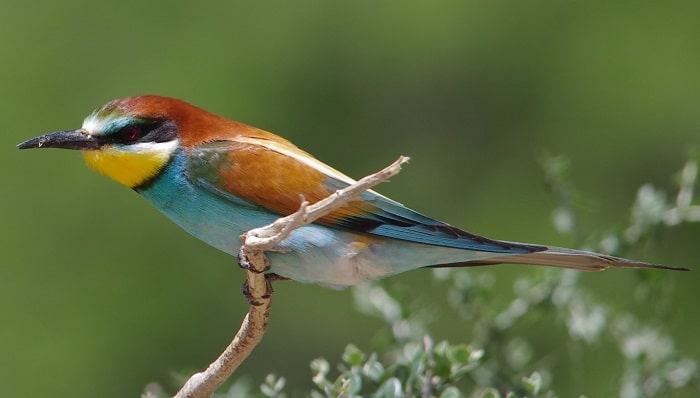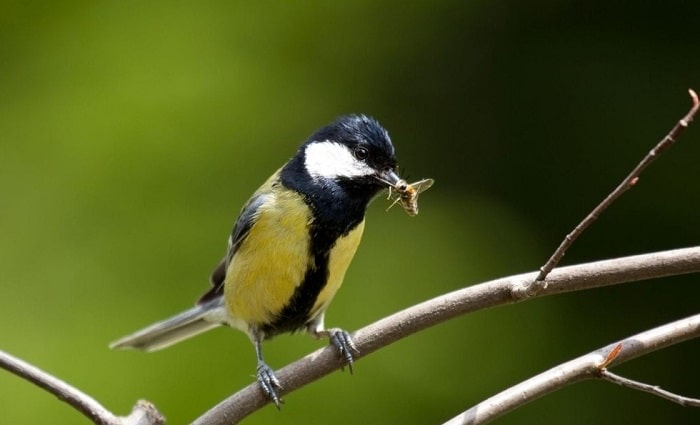Agriculturists will find beekeeping to be a highly gratifying endeavor. However, there are certain restricting elements, such as honey bee predators, which are one of the most difficult tasks for beekeepers. While honey bees use their stingers naturally to repel most of their adversaries, they do occasionally require aid from the beekeeper. In this article, we will look at what kind of birds eat bees and ways to keep honey and mason bees safe from birds.
Do birds consume bees?
The majority of birds are omnivorous by nature. Other bird species, such as bees, do not eat insects. Their diet is primarily comprised of seeds and plants. It is worth noting that most birds would prefer to consume slower-moving insects rather than bees, which are tough to catch.
A bird’s ability to catch a bee requires skill. To begin with, the little and rapid bee is difficult to capture since it never flies in a straight line. Second, not all birds can judge the proper angle and speed required to catch the bee. Most birds find it difficult to prey on honey or mason bees. As a result, most birds that eat bees favor those that are on the ground, dead or motionless bees.

How do birds catch bees?
When it comes to catching bees, most bee-eaters will employ the same strategy. They will either glide down and catch the bee in flight, or they will swoop down and grab them off a limb. Once captured, they use their long, curved beaks to hammer the bee’s head on a surface before removing the stinger and poisons and devouring the bee.
What birds eat bees?
In the United States, there are numerous bird species that consume bees. Most of these birds eat other insects as well, such as wasps and fire ants. Purple martins, for example, are opportunistic bird species that eat bees as well as wasps and fire ants. Bee-eating birds include thrushes, swifts, kingbirds, woodpeckers, and mockingbirds. The woodpecker is incredibly destructive. It will target a certain hive and consume the bees whenever the opportunity arises.
- The honey buzzard
The honey buzzard is a well-known bee-eater. It has a distinctive plumage and is rather huge. They only eat bee larvae and will not eat adult bees. Honey Buzzards have keen claws that they utilize to open the nest. They have thick plumage that renders bee stingers tough to penetrate.
- The northern cardinal
The northern cardinal is a common bee-eating bird found in seven states in the United States. It has a distinctive red plumage that makes it simple to identify. It will visit backyards and dine on sunflower and safflower seeds.
>>> Read more: Where Can You Buy Mason Bees?
Are bees threatened by birds?
Because birds and bees have co-existed for many years, predatory birds pose no direct harm to the bee population. When compared to other predators such as bears, foxes, shrews, badgers, and rodents, the influence of birds on the population is minor. These other predators not only eat the bees, but they also damage the hive and eat the honey.
How to protect bees from birds?
Feeders are the most effective way to keep bees under control. A garden feeder can help keep birds away from bees. Most bee-eating bird species in the United States can be fed. Because the northern cardinal is never afraid, feeders can be used to keep it away from hive yards.
To keep woodpeckers away from apiaries, attract them into birdhouses. The downy woodpecker, in example, is widespread throughout North America and simple to identify due to its white and black plumage. They are not afraid of feeders, making it simple to keep them in check.

FAQ
Q1. Do Pigeons eat bees?
Pigeons eat a variety of foods. Cereals, corn, peas, wheat, millet, and any other seeds form the foundation of their diet. Pigeons rarely eat insects, including bees. However it is best to keep birds and bees apart. If you wish to maintain pigeons, you need to make sure that their nesting location is far from bumble and honey bees.
Q2. Do Hummingbirds eat bees?
Hummingbirds are gregarious birds who like feeding at feeders. These birds are drawn to native flora and sweet formulations. They primarily consume sugar water and adore nectar. They also consume small insects, including spiders, bug larvae, and insect eggs. Hummingbirds, on the other hand, do not feed on honey or bumblebees. They also avoid stinging insects such as wasps. As a result, they are never a menace to any bee colony.
Q3. Do Sparrows eat bees?
These are carnivorous social birds that live in colonies. They also eat insects, like moths. They are able to consume food that has been presented to them. Sparrows, despite their opportunism, rarely eat bees. Sparrows can land on the hive entrance and feed on a few bees. They are primarily interested in dead bees and can be spotted on the ground feasting on them. They almost seldom feed on healthy worker bees.
Q4. Do Swallows eat bees?
Swallows and martins are both members of the same family. They eat insects and are extremely successful in their quest. They are well adapted to hunting while flying. The birds’ slim and streamlined bodies make it much easier for them to glide and maneuver. They do, however, avoid insects such as wasps and bees.
Conclusion
Some of the birds will just attack one or two beehives rather than the entire colony. Birds pose no threat to beekeepers because bees have coexisted with them for many years. You can, however, help reduce the impact of predatory birds by providing feeders for them. The majority of them are quite friendly and are easily enticed by nesting and feeding.
>>> Read more: How To Save Bees?
